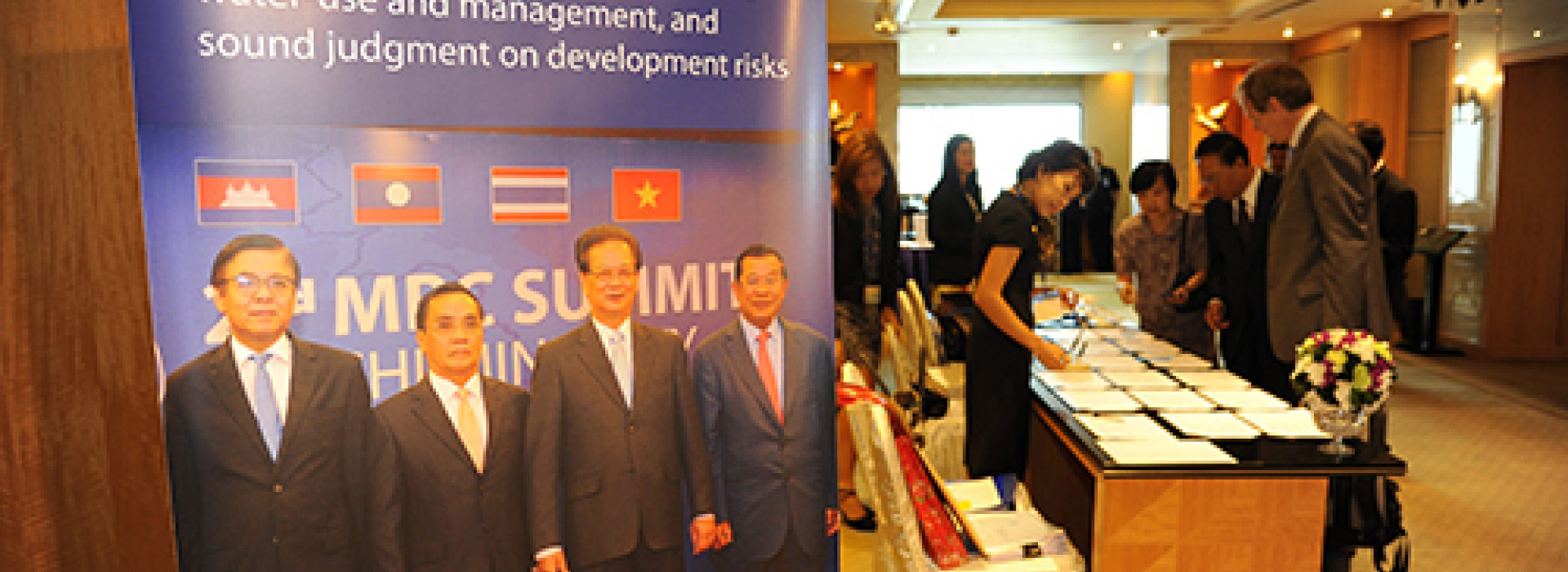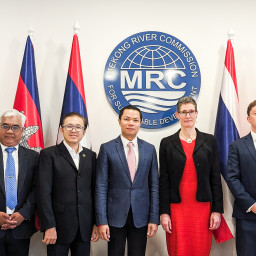MRC Council reaches conclusions on pressing issues
BANGKOK, Thailand, 26th June 2014—Ministerial delegates from the Mekong River Commission Council (the MRC Council) today reaffirmed the organisation’s relevance as a regional cooperation platform as it agreed on key issues including the acceleration of the Council Study, a decentralisation reform and the Prior Consultation process for the Don Sahong Hydropower Project.
The MRC Council is the highest, ministerial level of the organisation composed of water and environment ministers from the four Member Countries: Cambodia, Lao PDR, Thailand and Viet Nam. During the annual gathering, the Council stressed the need to expedite The Council Study on Sustainable Management and Development of the Mekong River, including the impacts of mainstream hydropower projects. The study aims at providing a better picture on potential transboundary impacts from development activities in the Mekong mainstream. The ongoing study, which will include topics related to agriculture, irrigation, domestic and industrial water use, flood protection and hydropower development, and navigation and infrastructure development, aims to fill gaps in knowledge and understanding about those topics.
As one of the most comprehensive items on the meeting’s agenda, the MRC has embarked on an institutional reform to decentralise core river basin management functions from the MRC Secretariat to the Member Countries. The meeting agreed on the recommendations provided by the MRC Secretariat to carry out the process, which will increase the efficiency and effectiveness of the organisation and turn it into a self-financed institution by 2030. Decentralisation will be a gradual process consisting of structural, staffing and financial reforms. One of its goals is to ensure well-coordinated operations at the regional and national levels.
Also during the meeting, the Lao delegation said it will resubmit the Don Sahong Hydropower Project to undergo the Prior Consultation process. The project was previously submitted to the MRC for the Notification purpose. The Prior Consultation will formalise the discussion and evaluation among the Member Countries and relevant stakeholders of the potential adverse transboundary effects of the project. The MRC Secretariat will facilitate the implementation of the process.
The Council Meeting also discussed other administrative and financial matters of the organisation. The two-day meeting will end tomorrow.
Languages
Lao
Thai
Vietnamese
Note to editors:
The MRC is the intergovernmental body responsible for cooperation on the sustainable management of the Mekong Basin whose members include Cambodia, Lao PDR, Thailand and Viet Nam. It is established to promote cooperation among the Member Countries and thus it is not a supra-national or regulatory body.
The Prior Consultation is a process under the MRC’s Procedures for Notification, Prior Consultation and Agreement (PNPCA), aiming at allowing the other riparian members to discuss and evaluate the transboundary impacts of the proposed use, which is the basis for arriving at an equitable solution for the project to avoid, minimise and mitigate harmful effects on the environment, particularly water quality and quantity. It is not an approval process for the project.
The Notification process, also under the PNPCA, is a prerequisite for the development of any water use project proposed for a tributary, which may have a significant impact on the mainstream, or for the Mekong mainstream during the wet season without inter-basin diversion. It requires a notification to the MRC and submission of relevant project information to enable the notified Member Countries to foresee the project’s water use and any significant impact that might stem from this.
-END-





